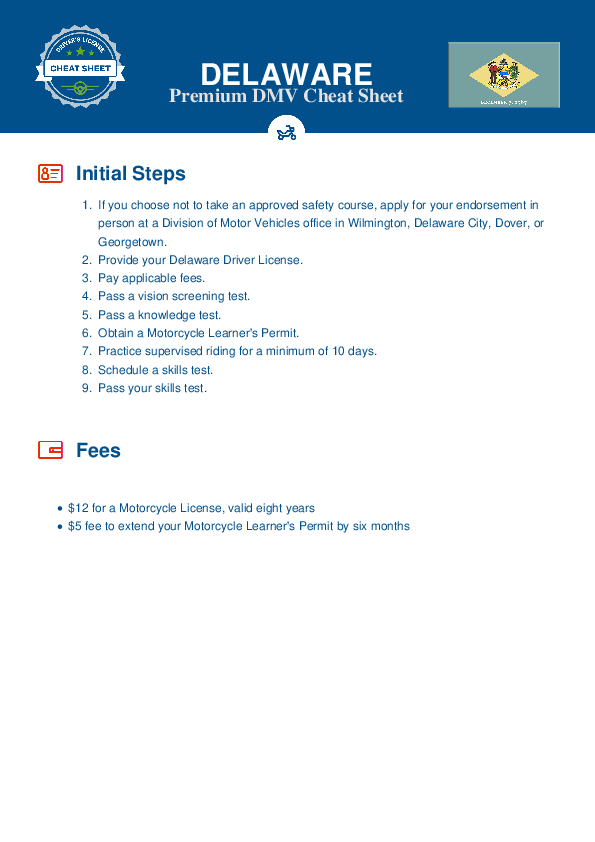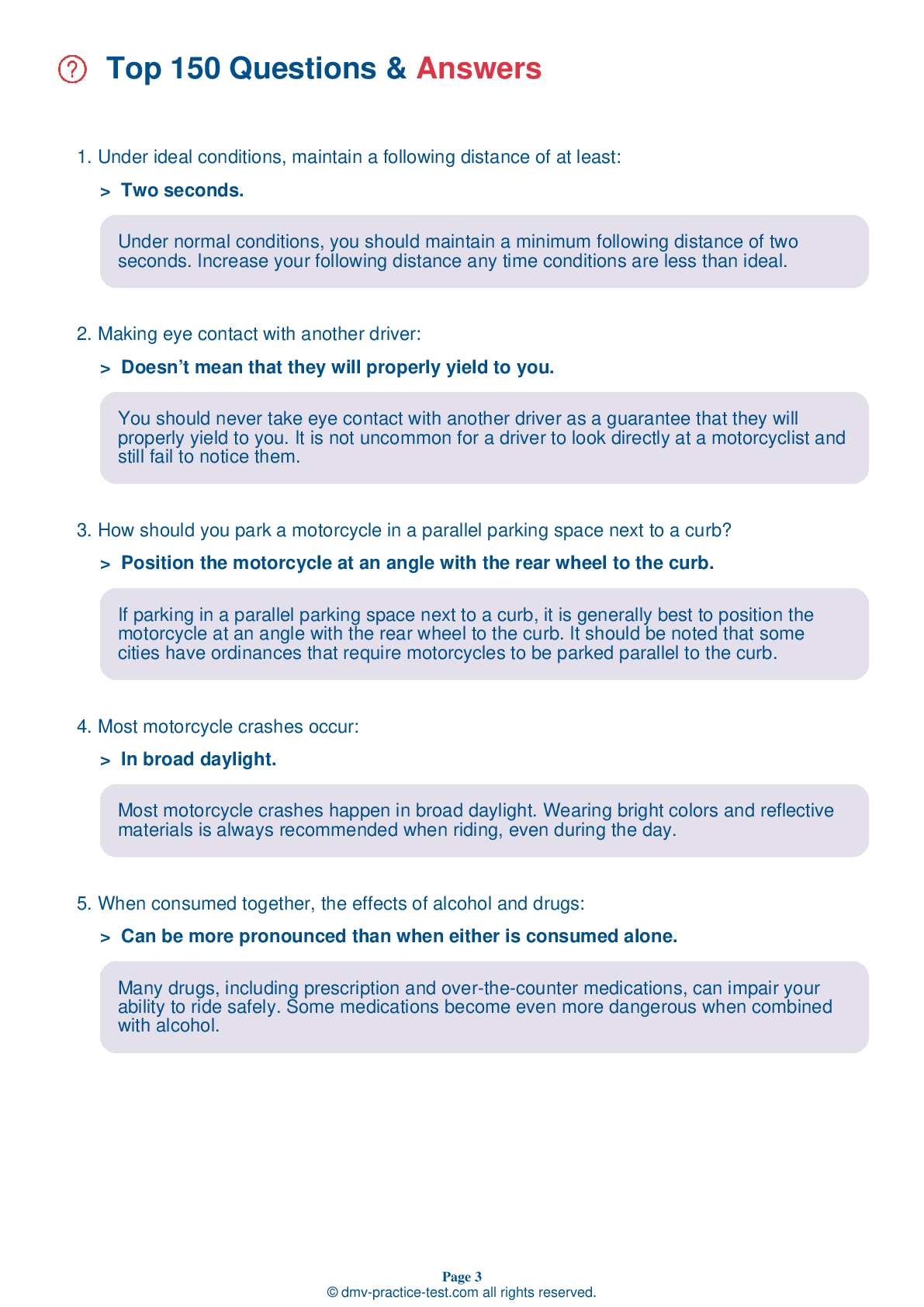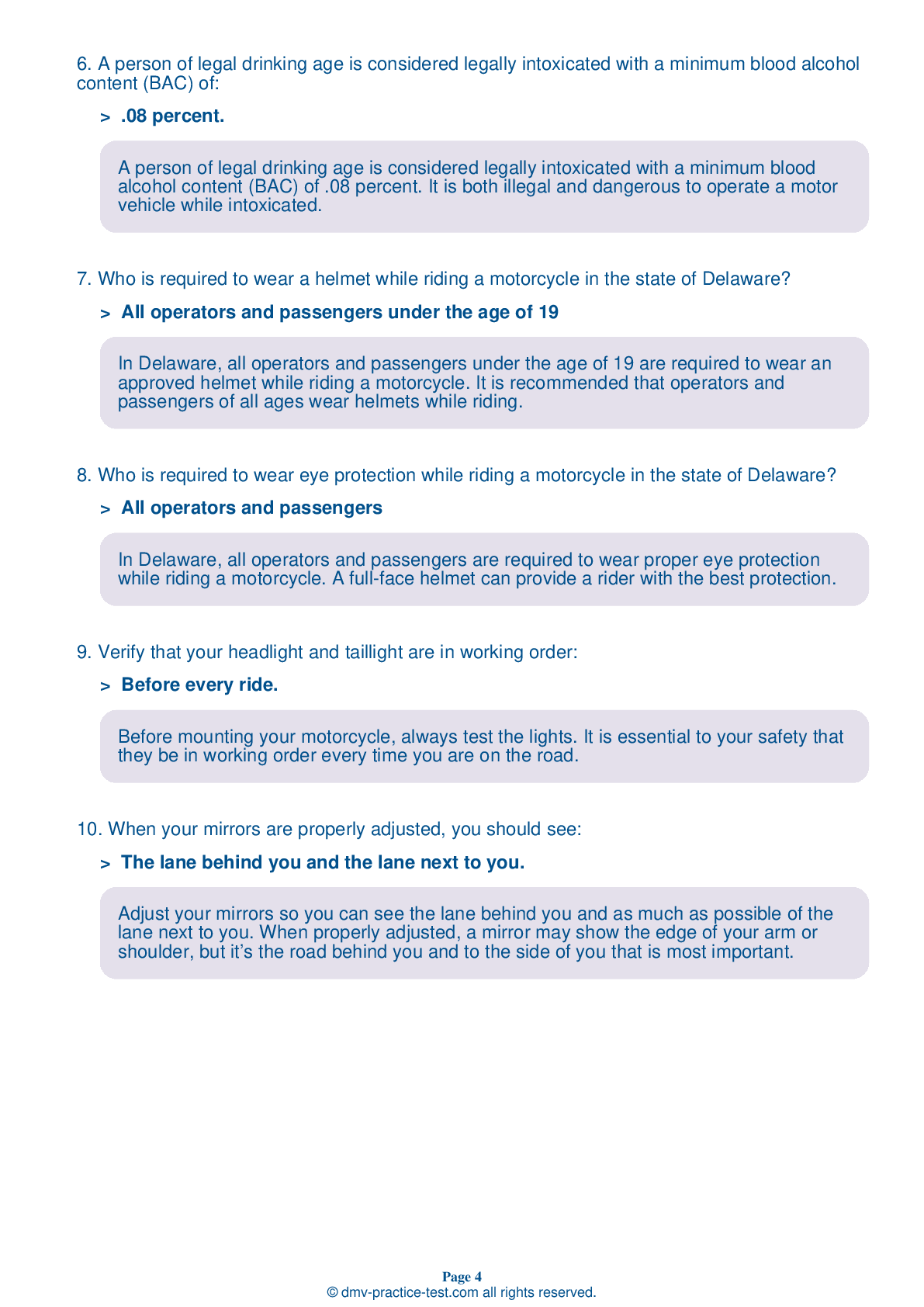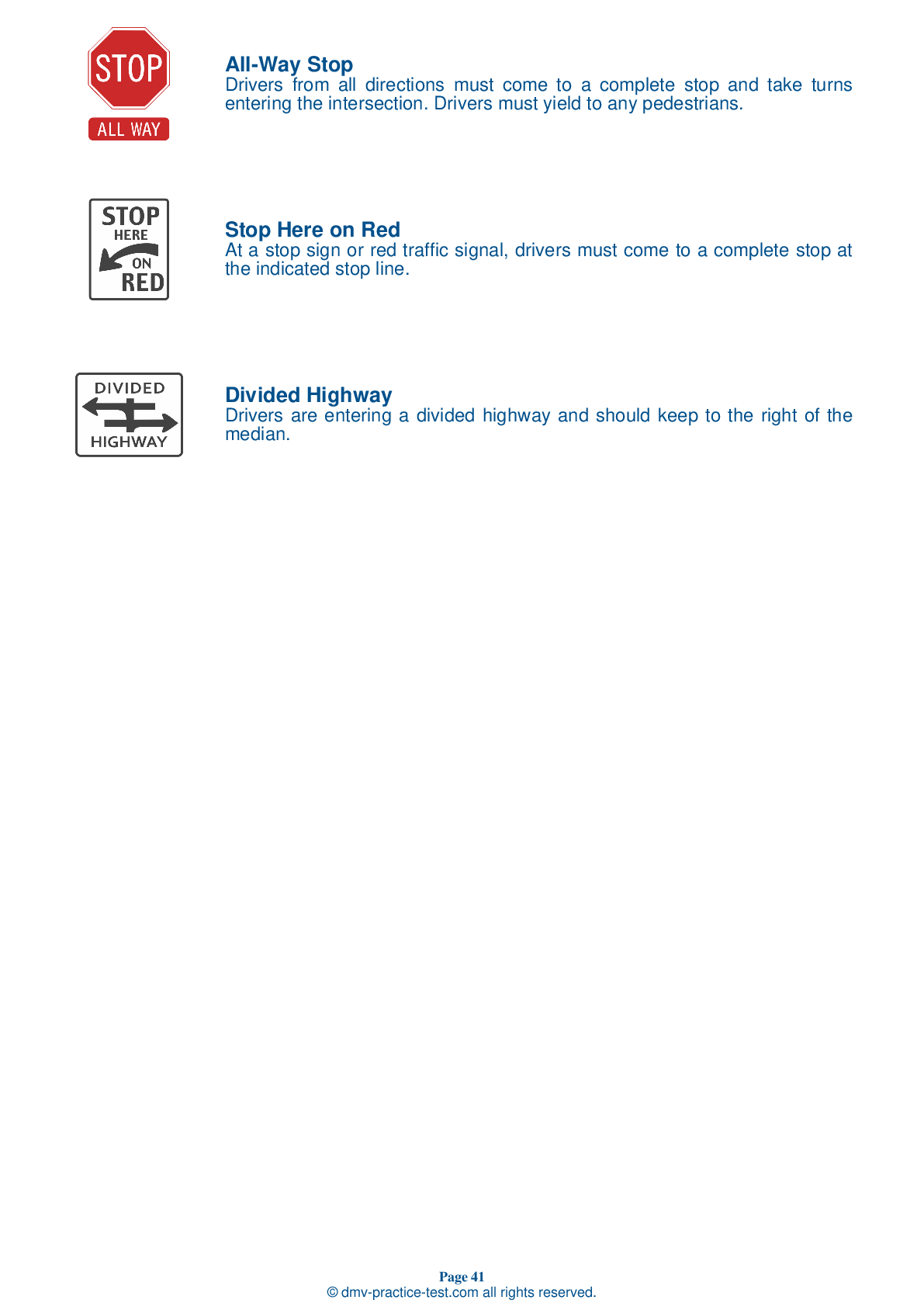DMV Permit Test #4
Motorcycle Test | License DE 2026 | FREE Online Practice! #4 Page 4 of 4
Take this FREE motorcycle test (license in DE 2026) to check your knowledge of the road rules. To improve your results, download a motorcycle handbook online, study theory, and practice for free on our website. Still worried about how to get a motorcycle license in Delaware in 2026? Check our website for more sample tests, train as much as possible, and boost your grades!
25
20
16
19 . To lessen the chances of a crash occurring, you should:
To lessen the chances of a crash occurring, you should make yourself visible, communicate your intentions to others, maintain adequate space cushions, search your path of travel at least 12 seconds ahead, identify and separate hazards, and be prepared to react to changing conditions.
20 . Which material provides the best protection in the case of a crash?
Clothing made of sturdy leather or synthetic materials provide riders the best protection in the case of an accident. Riders should wear long pants and jackets while riding.
21 . Your lane position should:
A properly chosen lane position should provide a number of benefits, including an increased ability to see others and to be seen. It should help you avoid wind blasts, other drivers' blind spots, and surface hazards. Your lane position should discourage other drivers from trying to share your lane and provide you with an escape route, should a hazard arise.
22 . When a lead rider is extending their left arm and pointing downward, it means:
Hand signals are an important part of communication when riding in groups. When a lead rider is extending their left arm and pointing downward, it means there is a hazard in the roadway on their left side.
23 . While accelerating a motorcycle with a sidecar, you should:
A sidecar adds additional weight to one side of your motorcycle. During acceleration, steer slightly in the direction opposite the sidecar to maintain a straight line path.
24 . It can be difficult to ride right after it starts raining because:
Pavement can be particularly slippery after it has just started to rain. Oil from vehicles will have not yet washed away from the surface of the road, forming a slippery mixture with the water.
25 . When preparing to ride with a passenger, instruct the passenger to:
Ask your passenger to wait to mount the motorcycle until after you have started the engine. They should sit as far forward as possible without crowding you and firmly hold onto your waist, hips, or belt.
2026 Delaware | Frequently Asked Questions
To acquire a motorcycle driver's license in Delaware, you need to apply for a motorcycle endorsement on your regular license. This involves passing a written test and a road skills test. Alternatively, you can complete a motorcycle rider education course, which includes both the written and skills tests. You must be at least 18 years old to apply.
In Delaware, the minimum age for obtaining a motorcycle driver's license, also known as a motorcycle endorsement, is 16 years old. However, if you're under 18, you must first have a graduated driver license (GDL) and complete a state-approved motorcycle rider education course before you can apply for the motorcycle endorsement.
Yes, you do need a dedicated license to ride a motorcycle in Delaware. This is typically referred to as a motorcycle endorsement and it can be added to your regular driver's license. You will need to pass both a written exam and a road skills test to get this endorsement, unless you successfully complete a certified Motorcycle Rider Education Program.
To apply for a motorcycle driver's license in Delaware, you'll need the following documents: proof of identity (like a birth certificate or passport), proof of Social Security number, two proofs of Delaware residency, and proof of legal presence in the U.S. If you're under 18, you'll also need a completed parental consent form.
Yes, you will need to take a written exam for a motorcycle license in Delaware. However, this requirement can be waived if you successfully complete a certified Motorcycle Rider Education Program. If you choose not to take the course, you'll need to pass the written test to demonstrate your knowledge of motorcycle operation and safety rules.
The Delaware motorcycle written test covers various topics including motorcycle operation and handling, traffic rules and regulations, riding strategy, dealing with emergencies, and sharing the road safely with other vehicles. The test is designed to assess your understanding of safe and effective motorcycle riding.
In Delaware, successfully completing a certified Motorcycle Rider Education Program (MREP) can waive the written and road tests for your motorcycle endorsement. However, you must still apply at the DMV, present your completion card from the MREP, and pay the required fees to get your motorcycle endorsement added to your driver's license.
To enroll in a motorcycle training course in Delaware, you first need to select a state-approved program. Then, you can register online or by phone. Courses typically require payment at the time of registration. You'll need to bring your own gear (helmet, gloves, etc.) and in some cases, your own motorcycle. Course completion can help waive the on-road test for licensing.
No, it's not mandatory to own a motorcycle for the license test in Delaware. You can use any motorcycle that is insured, registered, and meets safety requirements. However, you must have a valid motorcycle permit and be accompanied by a licensed motorcycle operator aged 21 or older to the test site.
Yes, you can use a friend's motorcycle for the driver's license evaluation in Delaware, as long as it is properly insured, registered, and meets all safety requirements. However, you must also have a valid motorcycle permit and must be accompanied by a licensed motorcycle operator aged 21 or older while driving to and from the test.
Yes, the Delaware motorcycle driving exam tests specific handling skills including starting and stopping, turning and swerving, and quick stops. You'll also be tested on your ability to balance at slow speeds. The exam aims to ensure you can safely operate a motorcycle on public roads. It's recommended you practice these skills before taking the test.
Yes, Delaware imposes restrictions on new motorcycle drivers under the Graduated Driver License (GDL) program. This includes a curfew preventing unsupervised riding between 10 pm and 6 am. Additionally, for the first six months, new riders cannot carry passengers. These restrictions are designed to ensure new riders gain experience safely.
Yes, your Delaware motorcycle license or endorsement allows you to legally operate a motorcycle in other states. However, it's important to note that when you are riding in another state, you must adhere to that state's specific traffic laws and regulations, which may differ from those in Delaware.
Yes, in Delaware, it is mandatory for all motorcycle operators and passengers to wear a helmet that meets the safety standards set by the U.S. Department of Transportation. This law applies regardless of the rider's age, experience level, or whether they're driving or riding as a passenger on the motorcycle.
In Delaware, there are two types of motorcycle licenses: a full motorcycle license and a motorcycle endorsement. A full motorcycle license is for those who only want to operate motorcycles, while a motorcycle endorsement is added to an existing car license, allowing the holder to operate both cars and motorcycles.
Yes, you can add supplementary endorsements to your motorcycle license in Delaware. For example, you can add a "3" endorsement if you want to operate a three-wheeled motorcycle. However, additional tests may be required, and the process can vary depending on the specific endorsement. It's best to contact your local DMV for more information.
Yes, the motorcycle license test in Delaware can be taken in a variety of languages other than English. These include Spanish, French, Russian, Vietnamese, and more. However, it's recommended to check with your local DMV office beforehand to ensure your preferred language is available.
A good strategy to prepare for the motorcycle license test in Delaware is to study the Delaware Motorcycle Operator Manual thoroughly. This manual covers all the information that you'll be tested on. Additionally, taking practice tests online can help you become familiar with the format of the test and identify areas where you need more study.
Yes, the motorcycle written exam in Delaware can be taken in several languages other than English. These include Spanish, French, Russian, Vietnamese, and others. However, it's advisable to contact your local DMV office in advance to confirm the availability of the test in your preferred language.
If you don't pass the motorcycle written test in Delaware, you are allowed to retake the test. However, you must wait at least 10 days before your next attempt. It's recommended to review the motorcycle operator manual and possibly take a motorcycle safety course before retaking the test to increase your chances of passing.



